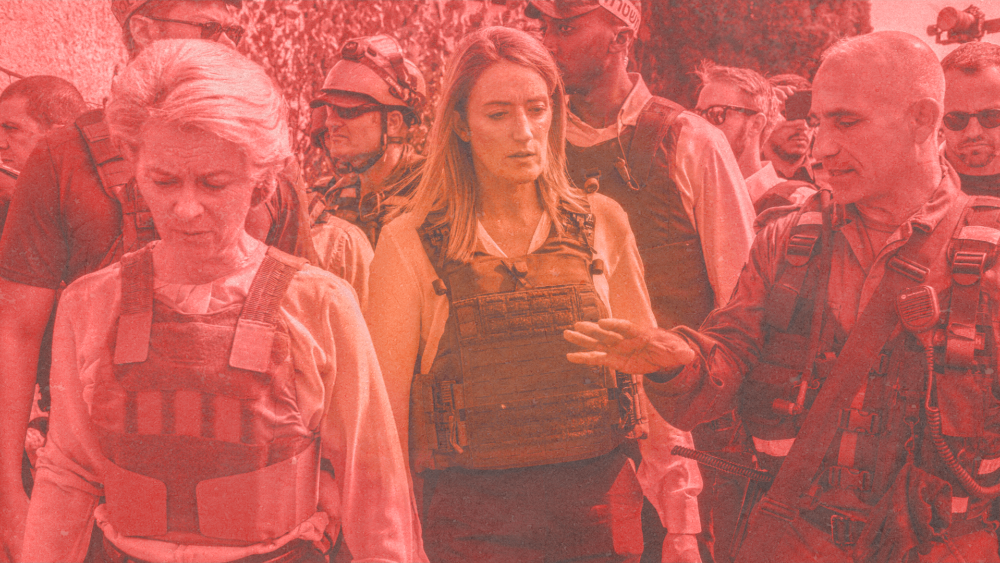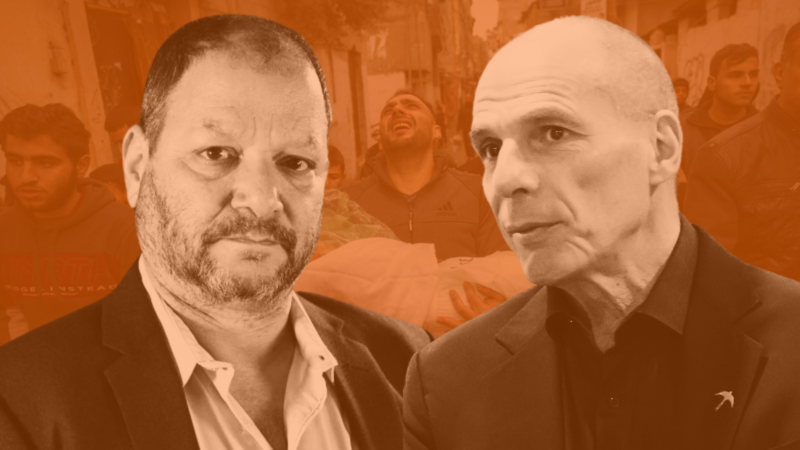Following the deadly October 7 attacks by militant group Hamas, European Commission president Ursula von der Leyen and European Parliament president Roberta Metsola reassured Israeli prime minister Benjamin Netanyahu that “Israel can count on the EU”.
As they met in Tel Aviv, Israeli Defence Forces (IDF) indiscriminately bombed the besieged enclave of Gaza and imposed collective punishment on its 2.3 million residents cutting off food, water and fuel — acts that constitute war crimes under international law.
In the same way that the clock on Israel‘s occupation of Palestine didn’t start on October 7, neither did the EU’s friendship with Israel.
The EU-Israel Association Agreement
Bilateral relations between the EU and Israel are underpinned by the 1995 Association Agreement and guided by the 2005 Action Plan, with total trade between the two parties amounting to €46.8bn in 2022.
Moreover, Israeli applicants can access EU research funds, with Israeli entities winning 1,661 grants totalling €1.28bn in the Horizon (H2020) R&D programme. Israel also joined Horizon Europe 2021-2027.
While the EU was busy strengthening ties with Israel, UN experts and rights groups were equally active calling out its apartheid system.
Since 1967, Palestinians who wish to extract water or build water infrastructure are required to obtain permits from the Israeli state, which are rarely granted. Israel’s National water company, Mekorot which has participated in various H2020 projects, regularly sinks wells in Palestine land.
In the same way that water has been colonised, every other aspect of life in Palestine is controlled by the Israeli regime, making it wholly unacceptable that EU public money is so deeply entangled in its apartheid architecture.
Of particular concern is EU funding for universities whose knowledge production becomes the backbone of Israel’s war strategy.
Tel Aviv University’s Institute for National Security Studies received €117.39m in H2020 funding.
Its military and strategic affairs director Gabi Siboni is credited with designing the Dahiya Doctrine, which advocates for overwhelming and disproportionate force to be used against ‘centres of civilian power’, a flagrant breach of international law.
Similarly, Jerusalem’s Hebrew University, which hosts an academic excellence programme for the IDF’s Intelligence Corps and has built a military base on campus, received €123.6m while Technion in Haifa won €89.6m in H2020 funding. Technion developed the D9R bulldozer, which is used to demolish Palestinian homes to make way for illegal settlements.
EU funds arms companies
Israel’s two largest arms companies, Elbit Systems and Israel Aerospace Industries (IAI), which supply the IDF, also receive European funding.
Elbit manufactures armed swarm drones, white phosphorus and cluster bomb artillery, the use of which is illegal under international law, while IAI, which participated in various H2020 projects including SAFEDRONE and RESPONDRONE, is a key partner in patrolling the apartheid wall turning Gaza into an open-air prison.
Once ‘tested’ on Palestinians, EU investment comes full circle when the EU and its member states buy back the end product.
As well as being used to indiscriminately bomb Gaza and surveill the Occupied Palestinian Territory, Israeli drones now patrol the Mediterranean, and are often the start point from which illegal deportation or kidnap operations are launched against persons seeking international protection.
Since 2021, Frontex has relied on data generated from an IAI Heron-1 drone, while the European Maritime Safety Agency flew Elbit’s Hermes 900.
Furthermore, many EU member states purchased armament from Israeli companies to replenish and modernise their stockpiles in the wake of the Ukraine war.
In a nutshell, EU taxpayers pay twice, Israeli entities benefit twice and the deadly consequences are felt twice, overwhelmingly by the Palestinian people, but increasingly so by those who flee other wars and conflicts and are confronted with the EU’s deadly borders regime.
Sounding the alarm on genocide
Over the past week 800 academics, including leading genocide and Holocaust scholar Raz Segal, sounded the alarm on genocide.
Similarly, UN special rapporteur Francesca Albanese warned of mass ethnic cleansing while UN experts decried the bombing of hospitals and schools as crimes against humanity.
While reaffirming Israel’s “right to defend itself” the EU launched a €75m humanitarian air bridge for Gaza as part of a broader programme to support those affected by “emergencies and shocks”. The source of the shocks was not specified.
Considering the mounting evidence of war crimes and genocide, it is difficult to interpret the EU’s unwavering commitment to Israel as anything other than a deplorable attempt to protect its interests and maintain a foothold in the Arab region. Wherever you look there is EU complicity, and it is precisely that, which has emboldened Israel to illegally dispossess Palestinians of their homeland for decades.
In line with calls made by hundreds of thousands of people across Europe and beyond, the EU must urgently call for a ceasefire, immediately revoke its unconditional support for Israel and break relations with the apartheid regime, and call for it to be held to account before the law.
Niamh Ni Bhriain is war and pacification programme coordinator at the Transnational Institute, founded in 1974 as a international research and advocacy institute committed to building a just, democratic and sustainable planet.
This article was originally published by EU Observer and has been republished with permission
Do you want to be informed of DiEM25's actions? Sign up here















